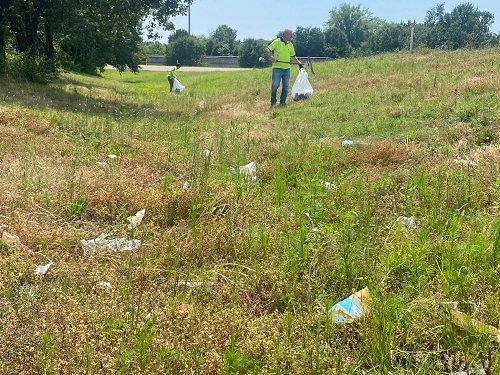The Tennessee Department of Transportation recently celebrated the 40th anniversary of its “Litter Grant Program.” That program – started in 1983 – provides funding to all 95 counties within the state to pay for a wide variety of litter-related efforts, such as litter and tarp law enforcement; cleanup and recycling events; and litter prevention education campaigns.
[Above photo by Tennessee DOT]
Those funds also help county governments participate in multijurisdictional and statewide collaborations with Tennessee DOT’s “Nobody Trashes Tennessee” litter prevention campaign, conducted jointly with Keep Tennessee Beautiful and its local affiliates.
“[Our] litter grant funding model ensures a comprehensive and collaborative approach to litter abatement and is making a real difference in keeping the state of Tennessee safe and beautiful,” explained Denise Baker, transportation supervisor for the Tennessee DOT, in a statement.
“By providing funding at the county level, communities across the state organize litter cleanups on roadways and river ways based on their specific needs,” she added. “We are thrilled to celebrate the 40th year of the program.”
Collectively, the agency’s litter grant program is responsible for removing an average of 11,243 tons of roadway trash annually and, in 2022 alone, nearly 29 percent of that statewide total was diverted from landfills and recycled. Additionally, 3,480 illegal dumpsites were cleaned up. All told, more than 435,529 tons of litter have been removed from Tennessee roadways since the program’s inception four decades ago, Tennessee DOT said.
The program’s impact is further amplified through local government partners that invest additional resources in trash cleanup and removal, as well as by individuals who contribute tens of thousands of volunteer hours.
This makes the program extremely efficient, saving communities and the state critical funds when compared to the costs of contracted litter pickup. For example, the agency said the 2022 statewide average cost of litter grant-funded cleanup totaled $14.40 per mile, while contracted litter pickup routinely costs Tennessee DOT more than $500 a mile.
On a yearly basis, the agency said it allocated $5.5 million via its Litter Grant Program – a total that has remained the same since 2017. The amount each county receives is based on a formula accounting for population and road miles. The current series of litter grant contracts includes just over $3.8 million for local litter pickup operations and over $1.6 million for litter prevention education.
The Tennessee DOT noted its litter grant contracts require that 20 percent to 35 percent of each county’s total funding is budgeted for litter prevention education efforts. Counties are also required to tackle litter prevention education in three of five designated categories: students, public, media, business, and government.
The grants also fund Keep Tennessee Beautiful, which provides litter prevention education, community engagement, and the promotion of volunteers for beautification projects, the agency said.

